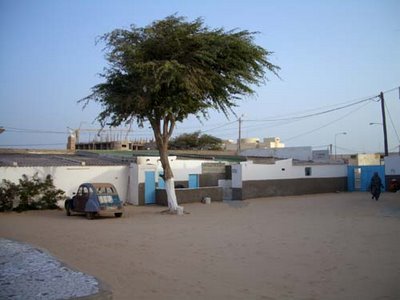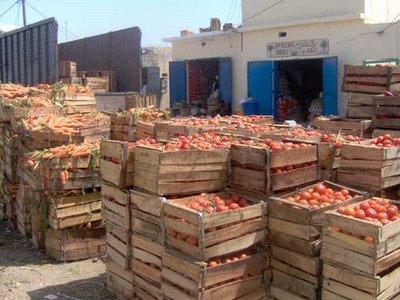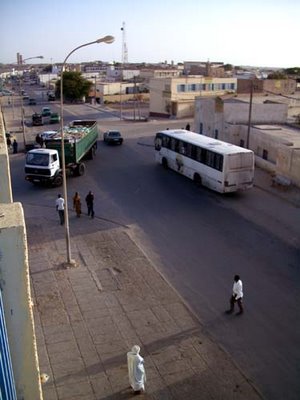Day 4: gnarled twists of fate
We slowly prepared ourselves for a day of travel -- this time, north to the desert. Knowing water and showers would be scarce, we took our time with the precious drops of hot water and toiletries and clean shirts. We got our instructions on where to go and who and how, hugged Molly good bye promising to see her in a few days, walked to the street and hailed a taxi. And this is when we had a strange turn of luck...
The other thing about taxis in Nouakchott besides being Mercedes is most of them are driven by Senegalese who come here looking for work. I greeted him in Wolof and asked him to take us to the Garage Atar, where we'd get the cars to Atar, the city in the far north that's the setting-out point for most desert voyages. We got to the garage and a gendarme (police man) approached our car, the driver negotiated our price with him, we were showed our taxi, paid and quickly left town. After we'd been in the car for awhile I started talking to the Senegalese guy next to me, something that wasn't too difficult since we were practically ear-to-ear and I was half sitting on his lap asking myself how I could get this close and personal to a men I hadn't yet met (after we'd left the garage we'd pulled over to squeeze one big-butted Mauritanian woman into the backseat of our car -- making us four in one standard size backseat for three). I asked him what he was doing in Atar and he said he was going to Nouadhibou to visit his family. It dawned on me a little then and I wondered why we were going towards Nouadhibou, a city on the coast, far from the desert. I saw signs on the road counting down the kilometers to Nouadhibou and still I thought eventually we'd veer off for Atar, that somehow the road would split and this guy would get out and go one way while we went the other. When three hours later we started driving alongside the ocean, I knew we weren't going to be spending the night in the desert, so I mentioned it to Tsilat, "I think we're going to that city where Mark lives." Mark being a peace corps volunteer we'd met in Dakar and "that city where he lives" being Nouadhibou which I hadn't yet learned to prounounce. Somehow the taxi driver had negotiated us a ticket to Nouadhibou and not to Atar. So much for speaking Wolof to taximen.
Since this is where we were, we decided to make the best of it and try to track down Mark. We took a cab into town, found a chill place to hang out and get some food, read our travel book about Nouadibou, tried calling Mark but he didn't answer. We checked in to a tiny auberge -- one narrow room, two beds on the floor. You could rent a mat in the tent if you wanted or even the old car in the courtyard to sleep in, but we opted for the room, as yet our skin hadn't constricted tight around traveling rough (that would come later), still valuing showers in the morning, clean clothes every day, and a semblance of a room over our heads -- at least one held up by a door that locks.
It was strolling around the streets of Nouadibou that we came into our own. It's a city on a narrow peninusula into the ocean with half of the peninsula being the territory of the Western Sahara (or Morocco however you look at it). Largely unpestered we wondered aimlessly through neighborhoods and markets looking into people's homes, shops, and anybody's business. That's the way it is here (here as in the Africa I've seen), everything that is done is done for the world to see. It's only the rich and the toubabs with something to hide or something to show who lodge themselves behind walls and guards and locked gates. I was surprised we weren't followed. In Senegal, I can't step out of the house without acquiring an admirer or two, especially when I venture into tourist places, men wanting to be my guide, to sell me a drum or a wooden statue a beaded necklace an African mask, and always to me marier. I was surprised by the busy-ness, the kids whizzing by on bikes chasing each other not giving us a moment's pause. In America, you see kids on bikes. In Senegal, jamais never. And nearly everwhere I looked -- shacks, stores, street corners -- people were clustered around a boiling pot of tea -- and we were offered it at every turn and we sipped it and we talked and it was polite and cordial and not whacking you in the face the way Dakar has a way of doing. Again, I was feeling the calm.
We finally reached Mark, who'd been having problems with his cell service, by calling another peace corps girl who'd been in his apartment before him and led us phone-to-door and it was warmth and smiles to see someone familiar. Mark entered peace corps late in his life compared to most of the bitties who prefer to find themselves straight out of college fleeing from desk jobs and unadventure. Mark was in business in Boston and still has that sense about him even all the way over here. He speaks French with his Boston accent and has a calm capable manner, always respectfully hearing someone out. He teaches English to classrooms of high school students and night classes to adults, which as we walked the streets with him, constantly brought on greetings by kids smiling to clamor out their how are yous.









1 Comments:
Big butted???? Do you think there might be some relations? I had to lol when I heard this expression. mom
Post a Comment
<< Home